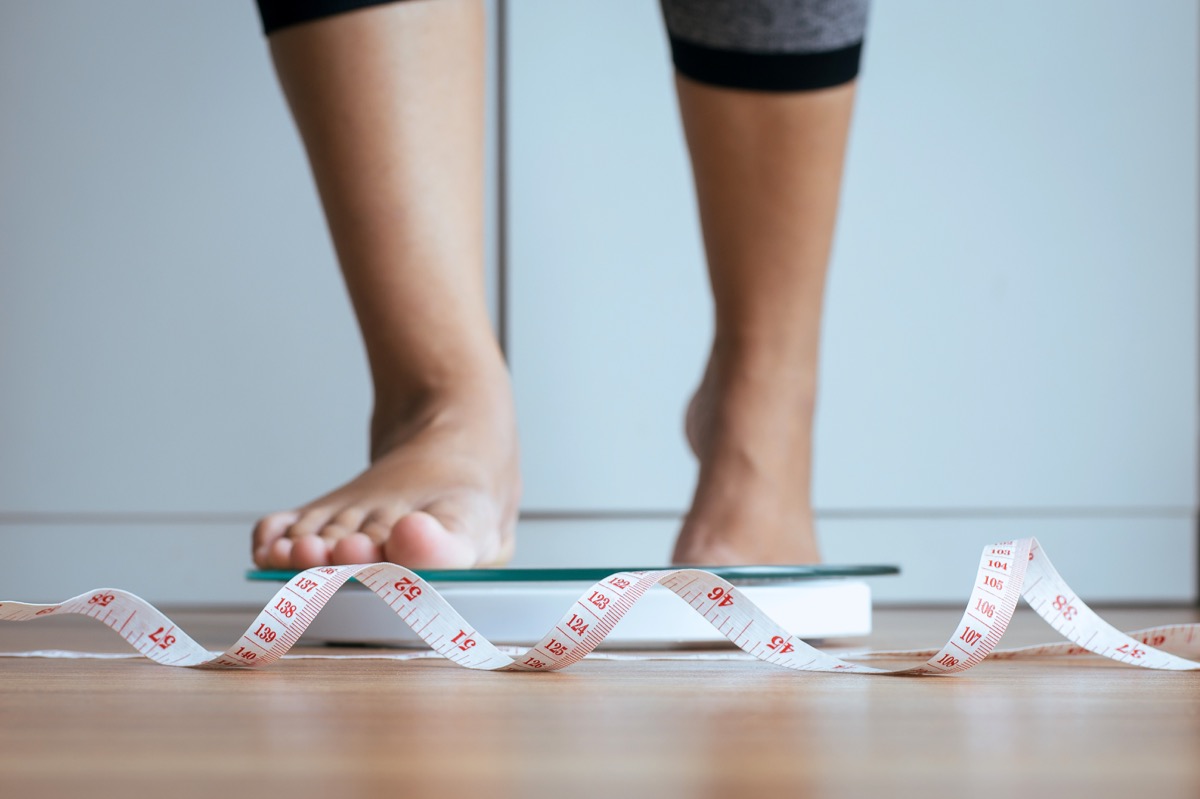7 Biggest Health Risks of Sitting All Day, Doctors Say
Inactivity is a leading cause of death and disability, according to the World Health Organization.

Since 1950, the rate of sedentary jobs—those that require prolonged periods of sitting—has increased by 83 percent, according to the American Heart Association. Add in the internet and streaming services, and it's easy to see how some people end up sitting from morning to night.
This increase in sedentary lifestyle has taken a profound toll on our health, says the World Health Organization (WHO). Their experts estimate that physical inactivity contributes to two million deaths per year, making it one of the top 10 leading causes of death and disability in the world.
How exactly does sitting wreak so much havoc on our health? Read on to learn the seven biggest health risks associated with sitting all day, and to find out what you can do to reverse its effects.
READ THIS NEXT: Doing This at Night Spikes Your Risk of Chronic Disease by 30 Percent, New Study Says.
1
Weight gain

Sitting all day can lead to a number of health problems, many of which are more likely to occur in individuals who are overweight or obese. "Sitting for long periods of time can lead to weight gain, as it slows down your metabolism and reduces the number of calories you burn," explains Brandon Czekaj, DC, a chiropractor and owner of Health and Rehab Chiropractic in Centreville, Virginia.
A 2012 study published in the Texas Heart Institute Journal illustrates just how closely obesity and a sedentary lifestyle are linked. "Data from the Centers for Disease Control (CDC) show that in areas of the United States where rates of obesity are higher than 30 percent, the prevalence of adults who report no leisure-time physical activity is also higher than 30 percent," the study authors write.
READ THIS NEXT: If You Sleep in This Position, You Could Be Hurting Your Spine, Experts Warn.
2
Back pain

Since sitting all day can strain the spine, neck, arms, and legs, many people who do so go on to develop chronic pain. "Sitting for extended periods can lead to poor posture and back pain, particularly if you're not sitting in an ergonomic chair or if you're slouching," warns Czekaj.
Matthew Chong, MD, an orthopedic surgeon at Cedars-Sinai Kerlan-Jobe Institute in Los Angeles, California explains why this is the case. "In short, the spine was designed for elongation. When the spine is elongated, the body can efficiently deliver oxygen, blood, and nourishment to the surrounding muscles, vertebrae, and discs," he tells Best Life. Chong adds that when you sit on a couch, bed, or other soft surface for prolonged periods, the spinal vertebrae become compressed. "Slumping or slouching is simply what most people do when seated, especially because many of us lack the core strength to encourage our spines into a more ergonomically healthy position," he says.
The good news is that taking breaks from long periods of sitting can profoundly improve your musculoskeletal health and comfort, according to experts at UCLA Health. They recommend that you stand, stretch, and walk every half hour for at least a minute or two. "Moving about and stretching on a regular basis throughout the day will help keep your joints, ligaments, muscles, and tendons loose, which in turn will help you feel more comfortable, more relaxed, and more productive," they note.
3
Heart disease

Research shows that when you sit all day, your risk of cardiovascular disease increases—even if you work out. However, one 2016 study published in JAMA Cardiology found that you would have to sit for a very long time for this to be the case. Study subjects who sat for 10 hours per day or more experienced increased incidence of heart disease, while those who sat for lesser periods saw no such increase.
Czekaj explains that this may be because sitting for long periods can lead to higher levels of cholesterol and triglycerides in the blood. Being overweight or obese, which is more likely with a sedentary lifestyle, can also lead to high blood pressure, fatty buildup in the arteries, and other risk factors for cardiovascular disease.
4
Diabetes

Czekaj tells Best Life that extended periods of sitting can also lead to higher incidence of diabetes. "Sitting for too long can increase your risk of developing Type 2 diabetes, as it can lead to insulin resistance," he says.
According to the American Diabetes Association (ADA), you can offset that increased risk by moving around periodically throughout the day. "The Standards of Medical Care in Diabetes recommends that everyone break up bouts of sitting with brief activity every 30 minutes but notes that mini exercise bursts may be particularly beneficial for people with type 2 diabetes. One study found that performing three minutes of movement every half hour improved blood glucose levels in adults with type 2 diabetes," they write.
For more health news sent directly to your inbox, sign up for our daily newsletter.
5
Anxiety and depression

Sitting all day can take a toll on your mental health, experts warn. Czekaj says those who lead a sedentary lifestyle tend to experience "increased levels of stress, anxiety, and depression" in particular.
A 2020 study published in the Journal of Environmental Research and Public Health looked at how levels of depression coincided with increased rates of sitting during COVID-19 lockdowns. The research revealed that participants who met the U.S. Physical Activity Guidelines (defined as 2.5-5 hours of moderate to vigorous physical activity each week) prior to the pandemic reduced their physical activity by an average of 32 percent during lockdowns. Those study participants reported feeling more depressed, anxious, and lonely during that time.
A 2021 follow-up study led by the same researcher, published in the journal Frontiers in Psychiatry, found that mental health seemed to improve as physical activity increased and sitting decreased. "People adjusted to life in the pandemic. But for people whose sitting times stayed high, their depressive symptoms, on average, didn't recover in the same way as everyone else's," said Jacob Meyer, PhD, assistant professor of kinesiology at Iowa State University, and lead author of the study, via press release.
6
Prostate trouble

According to S. Adam Ramin, MD, a urologic surgeon and medical director of Urology Cancer Specialists in Los Angeles, California, there's another, lesser-known consequence of sitting all day: increased risk of prostatitis, or inflammation of the prostate. "Many people know that sedentary habits can lead to obesity, which can severely impact heart and spine health, for example," he says. "But you may be surprised to learn about the ways that too much sitting can also hurt your urologic organs."
Ramin explains that for men, prolonged periods of sitting can harm the scrotum and prostate gland. "Sitting too much puts a considerable amount of pressure on a man's reproductive organs, which can, in turn, irritate. It's a vicious cycle, but it doesn't have to be." He adds that he has recently seen a "significant increase" in the number of patients coming to his office with prostatitis "directly attributed to prolonged sitting."
7
Impaired circulation

Michelle Greenwell, PhD, a movement specialist, tai chi instructor, and dance educator with a degree in Complementary and Integrative Health, says that sitting all day can also hurt your circulation. She explains that in particular, having your knees bent while sitting on a chair can make it difficult for blood to circulate properly. "The biggest problem with poor circulation is that your cells aren't getting as much oxygen as they need. When cells don't have the oxygen they need, they can't function well," explains the Cleveland Clinic.
The good news? As is the case with other symptoms of sitting for too long, your circulation should improve if you take regular movement breaks from sitting throughout the day. By making a point of getting up and walking or stretching at least every half hour, you may be able to avoid the worst health risks associated with prolonged sitting.
Best Life offers the most up-to-date information from top experts, new research, and health agencies, but our content is not meant to be a substitute for professional guidance. If you have health questions or concerns, always consult your healthcare provider directly.
- Source: https://www.ahajournals.org/doi/pdf/10.1161/JAHA.117.007735
- Source: https://www.who.int/news/item/04-04-2002-physical-inactivity-a-leading-cause-of-disease-and-disability-warns-who
- Source: https://pubmed.ncbi.nlm.nih.gov/27434872/
- Source: https://www.mdpi.com/1660-4601/17/18/6469
- Source: https://my.clevelandclinic.org/health/diseases/21882-poor-circulation





















